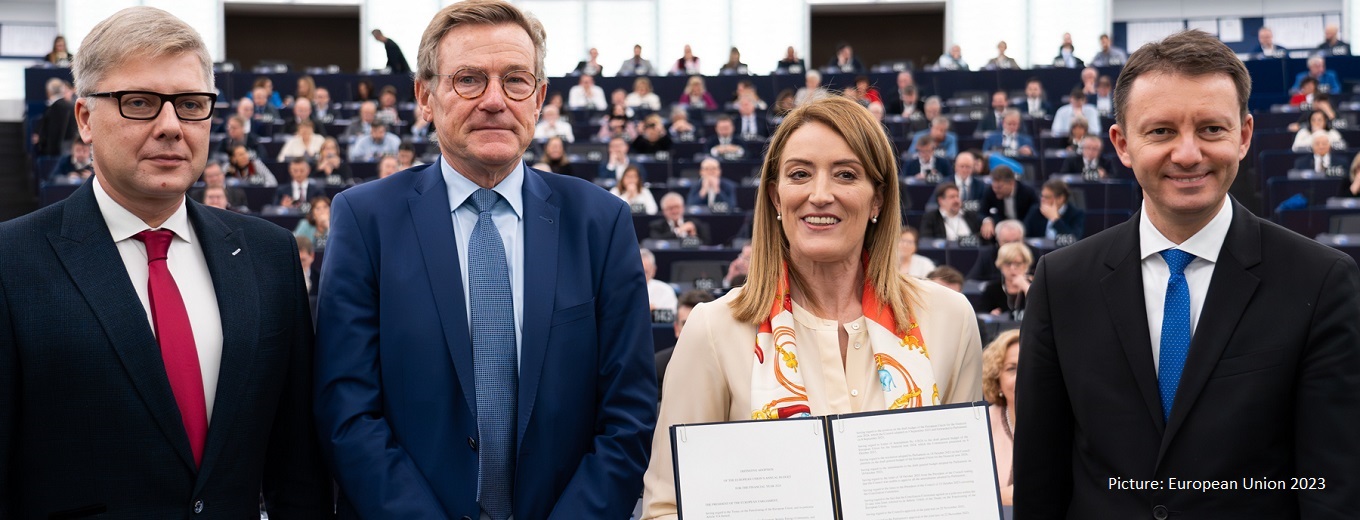Next year’s budget is slightly higher than proposed. Council agrees to the UK’s association; there is progress for Canada – and light on the horizon for Switzerland.
On 22 November, the European Parliament (EP) adopted the European Union’s 2024 budget with 519 votes to 79 and 30 abstentions. The Council approved the budget already on 20 November. The total budget for 2024 is €189.4 billion in commitments, the payments are set at €142.6 billion. During the preceding negotiations, the EP was able to add €666.5 million for key priorities such as humanitarian aid, Horizon Europe, Erasmus+ and transport infrastructure to the budget. The deal between Member States and EP that was reached on 11 November, included an increase of €85 million for Horizon Europe and €60 million to Erasmus+ on top of what the European Commission (EC) had proposed in its draft budget of 7 June 2023. Thus, the final Horizon Europe budget for 2024 is now set at €12.9 billion and the Erasmus+ budget at €3.8 billion. On 20 June, the EC had also proposed a reinforced long-term budget to confront urgent challenges during 2024-2027, the remaining years of the current multiannual financial framework MFF (see SwissCore article). This reinforced long-term budget includes funding to cover Ukraine’s immediate needs as well as recovery and modernisation efforts to support its path towards EU membership; it addresses migration, NextGenerationEU funding costs due to the surge in interest rates, and the Strategic Technologies for Europe Platform (STEP) to promote the EU’s long-term competitiveness on critical technologies (see SwissCore article). It is expected that after the approval of the 2024 budget, the Council of the EU will also agree on the mid-term revision of the EU’s long-term budget by the end of 2023. This would allow for additional allocations in 2024 through an amending budget to be proposed by the Commission.
On 15 November, the Council of the EU approved the association of the United Kingdom to the EU’s Horizon Europe and Copernicus programmes. This approval of the agreement in principle reached between the Commission and the UK government on 7 September 2023 can now be formalised by adopting a decision within the EU-UK Specialised Committee on Participation in Union programmes. The Committee is expected to adopt the respective decision in December. This decision would then allow researchers and organisations in the UK to participate in Horizon Europe on equal terms with their counterparts in the EU Member States as of 1 January 2024.
A few days later, on 24 November, during the Canada-EU Summit, EC President Ursula von der Leyen and Canada’s Prime Minister Justin Trudeau announced the conclusions of the negotiations for Canada’s partial association to Horizon Europe, covering pillar II of the programme. The signing of the Association Agreement is expected to take place in 2024, pending the completion of all necessary validations on both sides.
November also saw progress in Switzerland’s relations with the EU. On 8 November, the Swiss government decided to prepare a mandate for negotiations with the EU on a package of agreements, including association to Horizon Europe and Erasmus+. The decision was taken following a review of the exploratory talks between Switzerland and the EU that came to an end on 27 October. These talks that were started in March 2022 aimed at establishing a solid common basis for future negotiations, they covered all the components of the Federal Council’s package approach. Switzerland’s Federal Council will decide by the end of 2023 whether to adopt the draft negotiating mandate and submit it for consultation to the Swiss Parliament’s Foreign Affairs Committees and the Conference of Cantonal Governments (CCG). The Swiss government announced it will continue to involve the Swiss Parliament, the Cantons, the social partners, the business community, and other key stakeholders closely in the next stages of the process.

